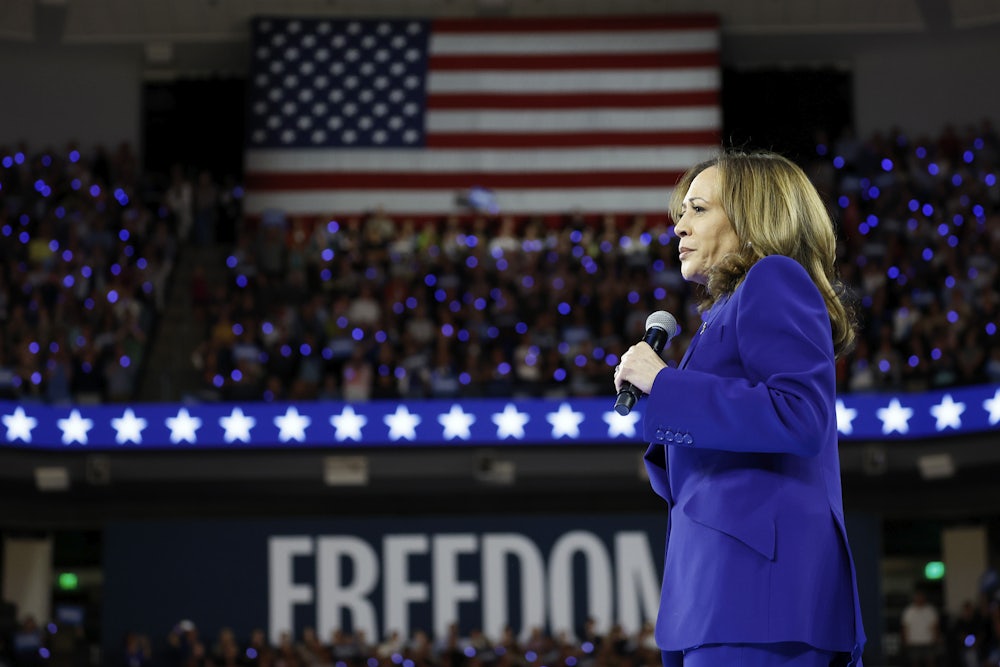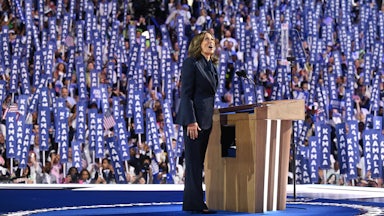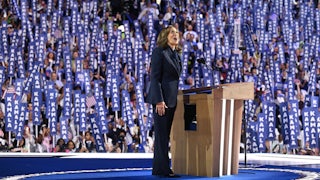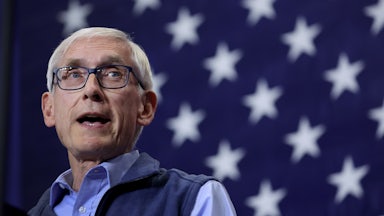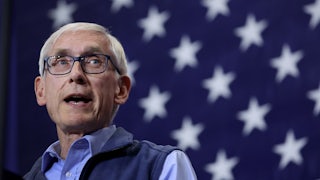Jodi Habush Sinykin has experienced the recent shift in enthusiasm among Democratic voters firsthand. These days, when she’s out knocking on doors in the Wisconsin district where she is challenging an incumbent Republican state senator, she can feel a newfound sense of “opportunity, and movement, and energy,” she told me one Sunday afternoon in late August.
The trick is figuring out how to wield it: directing that excitement for the newly minted Democratic presidential nominee, Vice President Kamala Harris, and channeling it to the key races for downballot Democratic candidates across the state. After President Joe Biden announced he would not run for reelection, Democrats are no longer bogged down with the impending sense of dread they felt so palpably in those weeks after the president’s discombobulated debate performance—that the presidential election was all but certain to swing to former President Donald Trump. But if there is a rising tide in Democratic voter support for Harris, candidates for congressional and state races want to catch it at its flood in the hopes that it brings in votes for them as well.
“I must say that even before that shift—even before Biden stepped back for Harris—that I was very careful to focus folks’ attention on the importance for Wisconsin,” Habush Sinykin told me, chatting between knocking on doors in a neighborhood of Whitefish Bay, a suburb north of Milwaukee. It was among the hottest days of the summer, the temperature climbing into the high 80s with the promise of an even warmer week to come.
After a few unsuccessful tries—this house empty; another with a sign barring any soliciting—a woman answered the door to Habush Sinykin’s knock. Her small dog bounded down the front steps, barking happily.
“I just wanted to share with you that my priorities are very much women’s freedom to make their own life and health decisions,” Habush Sinykin began, holding a stack of fliers she had printed that highlighted the policy differences between herself and her Republican opponent, incumbent state Senator Duey Stroebel. She had gauged correctly: When Habush Sinykin then asked what the woman’s top issues were, reproductive rights were the first one listed. Certain of the woman’s interest, it was time to ensure that she was interested in voting in all of the elections that she could in November.
“If you would please get the word out to your friends and neighbors and everyone how important it is to vote down the ballot,” Habush Sinykin urged the woman as she handed over the flier, which outlined her positions on reproductive care, education, conservation, and the economy. “It can’t just be one and done at the top [of the ticket].”
This is not Habush Sinykin’s first rodeo. She narrowly lost a special election for an open state Senate seat in 2023, under a previous version of the district that leaned more Republican. She is now challenging Stroebel in a newly redrawn state Senate district 8, which encompasses some of the suburbs of Milwaukee, including portions of the competitive “WOW” counties—Waukesha, Ozaukee, and Washington—which are slowly trending toward Democrats. The district was redrafted to be more evenly divided along ideological lines in the most recent round of redistricting, with a 53 percent Republican lean, making the race among the most competitive state Senate contests in the state.
Whitefish Bay is a well-to-do suburb north of Milwaukee, a village that grew, in part, out of a resort owned by beer barons; it has a median household income of roughly $142,000 and a population that is nearly 90 percent white. The village is liberal-leaning, as could be gathered by the occasional anti-Trump signs impaled in these lawns. There was some evidence of active support for Democrats, as well: In the afternoon, a man driving a white SUV pulled along the sidewalk and leapt from his car to take a picture with Habush Sinykin, excitedly telling her that she needed “to beat that horrible man,” referring to Stroebel.
Canvassing can be sweaty work; the dappled shade on sidewalks along the tree-lined streets did not typically extend to front doors. Despite any comfort provided by her blue tie-dye T-shirt, Habush Sinykin was wearing jeans in weather better suited to shorts, and beginning to feel the heat. She knocked on another door with four quick raps, to the tune of “shave and a haircut.” The elderly woman who answered noted that “somebody came the other day.”
“But it was for the presidency,” the woman added quickly, once Habush Sinykin introduced herself as a state Senate candidate.
“I’m glad you said that. What I’m really trying to explain to folks is how important it is to vote down the ballot,” Habush Sinykin replied.
Therein lies the rub for state legislative candidates like Habush Sinykin: Voters are fairly engaged with the presidential election, particularly in quadrennially swingy Wisconsin. Harris has excited progressive voters in the state, bringing desperately needed momentum to what had been a flagging presidential campaign. But downballot Democratic candidates need the voter enthusiasm that’s piling up at the top of the ticket to trickle down to their own elections if they want to finally achieve what has been an elusive goal—flipping the state Senate and the state Assembly, both of which have been held by Republicans since 2011.
“Please get the word out for how important it is for our state,” she continued, her voice taking on an urgent tone. The woman reached around her screen door, accepting one of Habush Sinykin’s fliers.
Wisconsin is one of the last true remaining swing states in the country, able to decide the presidential election or determine the tilt of Congress with a few thousand votes one way or the other. In 2016, former President Donald Trump won the state by fewer than 23,000 votes; former President Barack Obama had carried the state by nearly seven percentage points just four years before. President Joe Biden narrowly won Wisconsin in 2020 by an even smaller margin: roughly 20,000 votes.
Democrats on the ground in Wisconsin felt an overwhelming ennui in the three weeks between Biden’s disastrous debate performance in late June and his decision to bow out of the race on July 21. Andy Berger, a volunteer for the Wisconsin Democrats who hosts canvass launches from his home north of Milwaukee, described supporters as almost morose during the “Biden era.”
“I would get maybe six people to sign up on a Saturday, three would actually show up, and they would be demoralized and doing it out of a sense of obligation,” said Berger.
Wisconsin is likely to play a pivotal role again in the presidential election in 2024, with polls showing Harris and Trump neck and neck in the state.
Dori Davenport Thexton, the co-leader of the local chapter of the grassroots progressive organization Indivisible in Wauwatosa, a town west of Milwaukee, said the Democratic volunteers she hosted at a canvass launch the week before Biden’s announcement were filled with trepidation about knocking on doors and potentially facing people who didn’t want to vote.
“The next weekend, after he announced that he was stepping down and Kamala Harris was going to be [the nominee] and he was supporting her, everybody who came from my house was just brimming with enthusiasm. Like, ‘I can’t wait to get out there,’” Thexton said.
In Wisconsin, statewide races tend to be extremely close and incredibly expensive. In 2022, incumbent Senator Ron Johnson, a Republican, defeated Democratic challenger Mandela Barnes by just one percentage point, with outside spending in the race reaching upward of $120 million. Democratic Governor Tony Evers won in 2018 by just over one percentage point, narrowly expanding that margin of victory in 2022 with 51.2 percent of the vote.
The exception to the rule of relatively tight statewide elections appears to be Senator Tammy Baldwin. To say that Baldwin outperforms her fellow Democrats in the state would be like commenting that Olympian swimmer Katie Ledecky outperforms other swimmers: It’s undeniably true but with little consideration for scale. In 2018, the year that Evers won the gubernatorial election with 49.6 percent of the vote, Baldwin held onto her Senate seat with a margin of victory of nearly 11 percentage points.
Sitting in a porch chair in the shady backyard of a supporter’s home in a suburb outside of Madison, Baldwin told me that she wasn’t “counting on a lot of Trump-Tammy voters this time around.” Given that Wisconsin is so evenly split along ideological lines, Baldwin said, Democrats need to have higher turnout than Republicans if they want to win on the federal and the state level.
In early July, the week after Biden’s disastrous debate performance, Baldwin traveled through northern Wisconsin—missing a Biden campaign event elsewhere in the state. “Every event I did … after it was over, people would come up and say, ‘We’re excited about your race, we love Joe Biden, but …,’” Baldwin said, letting the unspoken concerns of Democratic voters hang in the air. “These are the people you’re relying on to get to the doors and to pull other people on. And I felt like with the level of worry that they were carrying around, anxiety that they were carrying around, that this was going to affect just the vigor with which we conducted the campaign.”
With Harris at the top of the ticket, Baldwin continued, that pressure lifted, and the newfound energy of Democrats “filled the vacuum.” In an indication of increased Democratic enthusiasm and confidence, Baldwin herself spoke at the Democratic National Convention in late August—a scenario hard to imagine if Biden was still in the race.
I chatted with Baldwin after she spoke at a canvass launch, where supporters had gathered to be hyped up before dispersing to knock on doors in support of Democratic candidates. Sue Gilbert, a 65-year-old volunteer attending the event with Baldwin, said that she had felt a palpable change among Democrats after Harris became the presumptive nominee.
“It was getting really depressing. As much as I really like what Joe Biden has done, it was going to be hard for him to have a chance,” Gilbert said. “As soon as the change happened, you could feel a ripple of energy. I felt amazing.”
Republicans have controlled the Wisconsin legislature since 2010, redrawing district lines in 2012 to be gerrymandered in their favor. Ben Wikler, the chair of the Democratic Party, compared Republicans in the state legislature to “people who get that magic lamp and wish for more wishes.”
The map that resulted from the 2012 redistricting—which often drew comparisons to “Swiss cheese” for the way it grouped some constituents in islands not contiguous to the rest of their district—allowed the GOP to maintain overwhelming power in the legislature, even as a Democratic governor was elected in 2018 and reelected in 2022.
“We really did not have a representative democracy for 10 years. In a 50-50 state, it was more likely that Republicans would get a supermajority than Democrats would get a majority,” said state Representative Greta Neubauer, the minority leader in the Wisconsin State Assembly.
In late 2023, the Wisconsin Supreme Court struck down the state’s gerrymandered maps, ruling that the noncontiguous lines in several districts violated the state constitution. (The new ideologically liberal majority of the court that overturned the maps had been established earlier that year after a competitive special election.) Wisconsin Governor Tony Evers signed new legislative maps into law in February. The fight over the state legislature has attracted significant spending, both from the Wisconsin Democratic Party and outside groups such as the States Project and the Democratic Legislative Campaign Committee.
The prospect of voting for state legislative candidates in non-gerrymandered districts may have heightened enthusiasm among voters in the state. “We’re getting more volunteers out that have never volunteered before, because they finally feel like their voice and their vote matters at the bottom of the ticket,” said state Senator Dianne Hesselbein, the minority leader of the Wisconsin state Senate. “Whereas before, it was like, ‘Yep, I’ll vote for the president, but it doesn’t matter, because I’m always going to have this Republican senator because I’m in a gerrymandered district.’”
Contrary to conventional wisdom that downballot races garner less attention than the top of the ticket, some Democrats believe that these elections may have been engaging voters while enthusiasm was otherwise flagging due to worries about Biden’s ability to win reelection. If polls had Baldwin reliably running ahead of Biden, Democrats hoped she might pull voters in support of him across the finish line—as she may have done with Evers in 2018. Thexton, the co-leader of Indivisible Tosa, said that she believed interest in state legislative races helped push Evers to victory in 2022.
Before the change at the top of the ticket this summer, voters on the trail would talk to Democratic congressional candidate Peter Barca—who is challenging Republican incumbent Representative Bryan Steil in his southeastern Wisconsin district—about his race, but not necessarily bring up the presidential contest. But now, said Barca, there is “great energy” around the presidential race as well. Enthusiasm that was once bottom-up is now trickle-down.
“I’ve seen just tremendous upsurge in enthusiasm and participation. We see a lot more people signing up,” Barca said. “We’ve seen a big pickup also even in fundraising.”
Still, getting voters engaged in the presidential race doesn’t always mean they’ll keep diving below the surface of political waters to reach the bottom of the iceberg where state legislative candidates float. This year may herald a significant uptick in spending on the races that will decide control of the state legislature, but the money flowing to the candidate running for critical seats in Washington will far outpace that for downballot races. If Wisconsinites are seeing an abundance of ads and billboards for Harris and Trump, or for Baldwin and her Republican opponent, banking mogul Eric Hovde, the state legislative races may not pierce their consciousness in the same manner.
Moreover, while Democrats are generally bullish about flipping control of the state Assembly this year, flipping the upper chamber in Madison may be a more long-term goal, as only 16 of the 33 Senate seats are currently open; Democrats may pick up a few of these spots, like the one contested by Habush Sinykin, but there are likely not enough competitive seats out there to contemplate earning a majority before 2026.
“Two years from now, those maps are even better for us,” said Hesselbein. Wikler, the chair of the state Democratic Party, said his party would “pave the way to a Senate majority this year.”
But the voters who are invested in the long game of flipping both chambers of the state legislature may be more politically engaged than even average Democrats who are now enthusiastic about Harris’s rise. “This area has a high level of engagement—still not that many people are focused on the state Senate,” said Berger, the volunteer for Wisconsin Democrats who lives in the competitive 8th state Senate district. “The people who are understand that [with] redistricting, we have fairer maps now, and that Jody’s running in a key district. But … the main motivator is defeating Trump.”
Habush Sinykin’s primary goal while canvassing in Whitefish Bay was to “engage people in how important it is to vote downballot,” which she described as a “slightly different” approach to one she might employ in the swingier portions of the WOW counties.
Whitefish Bay may lean Democratic, but it is not entirely friendly territory for Habush Sinykin. One woman who opened the door politely but firmly told the candidate that she was “on the other side.” At another house, when a middle-aged man in a T-shirt bearing the logo of the ideologically conservative Hillsdale College answered his door, Habush Sinykin began by asking his priorities. “The border is huge,” said the man.
“State Senate,” interrupted Habush Sinykin’s son Zach, who was managing the app that determined which house with an invariably manicured lawn she should visit next. While the state legislature has significant power in dictating the direction of the state’s future, federal border policy does not fall under its aegis. The man, who identified himself as Tom, ticked off public safety and the tax base as his top issues, and asked Habush Sinykin how she felt about the “Defund the police” slogan. (She does not think it is an effective strategy, and talked about investing more in local police and fire departments.)
“What we need in Wisconsin are legislators like I wish to be, who have the heart-set and the mindset to work across the aisle, because we’re a purple state,” Habush Sinykin insisted, pointing to work she has done as an environmental lawyer on bipartisan state bills. Tom agreed with her, denouncing the “kill or be killed politics” of the modern era. As they talked, the American flag in the pole by Tom’s door waved gently between them in the light breeze, like a bad metaphor.
“A lot of people are just feeling conditioned to be apathetic towards politics, and [like] ‘My vote doesn’t matter,’” Tom said. “I mean, the last presidential election was decided by what, 50,000 votes?”
Habush Sinykin reeled the conversation back to the district level. “I feel very similarly to you about being educated and informed, and we have so much on the line,” she said. “Wisconsin’s been waiting for these new fair representative maps for over 13 years, so this is our chance to get legislators back who will work together.”
Regardless of whether Tom supports her in November, Habush Sinykin was confident that he now knew more about the state Senate election, taking one of her fliers and promising to read it closely. One more conversation about politics made a little less national.
“It’s going to be hard to beat this door,” Habush Sinykin said.
